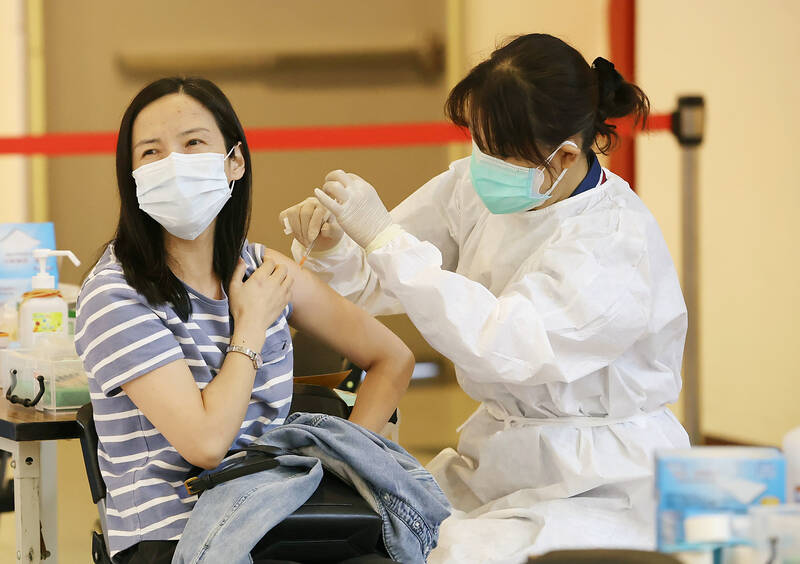Claims for COVID-19 insurance policies could drop next month as the government plans to relax one of its quarantine rules, but property insurers might still proceed with their capital injection plans, the Financial Supervisory Commission said yesterday.
The Central Epidemic Command Center (CECC) announced on Monday that from Nov. 7, caregivers of confirmed COVID-19 cases would no longer need to self-quarantine if they test negative after the confirmed case completes their seven-day quarantine period.
As many COVID-19 insurance policies have been designed to pay policyholders for being quarantined, property insurers would have fewer compensation claims following the rule change, the commission said.

Photo: CNA
Each property insurer could pay NT$1 billion or NT$2 billion (US$30.94 million or US$61.88 million) less in compensation based on the eased rule, Chinese-language news reports said.
“COVID-19 insurance is unlike accident insurance or fire insurance, the premiums of which can be adjusted based on a fixed mechanism. Whether and how property insurers should compensate policyholders of COVID-19 insurance hinges on the nation’s anti-virus regulations,” Insurance Bureau Deputy Director-General Thomas Chang (張玉煇) said.
However, it is too early to say that some property insurers would not need to implement capital injection plans to boost their finances, because the COVID-19 situation is still developing, Chang said.
Accumulated COVID-19 insurance claims grew to NT$107.18 billion as of Monday, up NT$6.4 billion from a week earlier, the commission said, adding that 2.83 million policyholders had been paid out so far, accounting for 56 percent of all people who had purchased COVID-19 insurance.
The combined net worth of all property insurers last month plunged NT$538.5 billion month-on-month to NT$828.5 billion, with combined pretax losses of NT$110.4 billion for the first nine months of the year, commission data showed.

Vincent Wei led fellow Singaporean farmers around an empty Malaysian plot, laying out plans for a greenhouse and rows of leafy vegetables. What he pitched was not just space for crops, but a lifeline for growers struggling to make ends meet in a city-state with high prices and little vacant land. The future agriculture hub is part of a joint special economic zone launched last year by the two neighbors, expected to cost US$123 million and produce 10,000 tonnes of fresh produce annually. It is attracting Singaporean farmers with promises of cheaper land, labor and energy just over the border.

US actor Matthew McConaughey has filed recordings of his image and voice with US patent authorities to protect them from unauthorized usage by artificial intelligence (AI) platforms, a representative said earlier this week. Several video clips and audio recordings were registered by the commercial arm of the Just Keep Livin’ Foundation, a non-profit created by the Oscar-winning actor and his wife, Camila, according to the US Patent and Trademark Office database. Many artists are increasingly concerned about the uncontrolled use of their image via generative AI since the rollout of ChatGPT and other AI-powered tools. Several US states have adopted

KEEPING UP: The acquisition of a cleanroom in Taiwan would enable Micron to increase production in a market where demand continues to outpace supply, a Micron official said Micron Technology Inc has signed a letter of intent to buy a fabrication site in Taiwan from Powerchip Semiconductor Manufacturing Corp (力積電) for US$1.8 billion to expand its production of memory chips. Micron would take control of the P5 site in Miaoli County’s Tongluo Township (銅鑼) and plans to ramp up DRAM production in phases after the transaction closes in the second quarter, the company said in a statement on Saturday. The acquisition includes an existing 12 inch fab cleanroom of 27,871m2 and would further position Micron to address growing global demand for memory solutions, the company said. Micron expects the transaction to

A proposed billionaires’ tax in California has ignited a political uproar in Silicon Valley, with tech titans threatening to leave the state while California Governor Gavin Newsom of the Democratic Party maneuvers to defeat a levy that he fears would lead to an exodus of wealth. A technology mecca, California has more billionaires than any other US state — a few hundred, by some estimates. About half its personal income tax revenue, a financial backbone in the nearly US$350 billion budget, comes from the top 1 percent of earners. A large healthcare union is attempting to place a proposal before